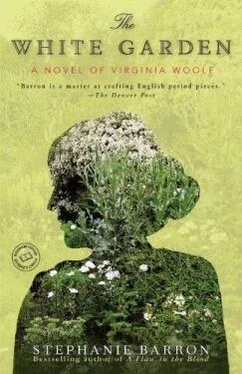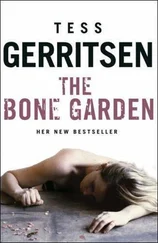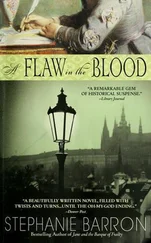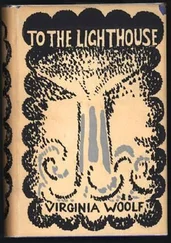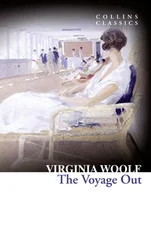“I’d eat there,” Jo said. “What would it look like?”
He stared off into space for a moment. “I love the texture of old buildings. By that I mean all that’s authentic about them.”
There it was again — the connoisseur in Peter, his instinct for what was true. It was the quality Jo trusted most.
“Serviceable buildings that had a utility once,” he continued. “A group of oast houses, for instance, or an ancient barn. I’d like bare timbers and stone floors and a really massive hearth people could sit in with their wineglasses. Rustic, relaxed, but absolutely top drawer. Know what I mean?”
“Yes. I do.”
“Ideally, there’d be a working potager in the back.”
“Peter.” Jo set down her wineglass. “I just designed the most fabulous potager for Gray. An entire walled acre, divided into quadrants — espaliered fruit trees, seasonally rotated heirloom and organic vegetables, everything from five types of beet to eleven types of lettuce. It’s going to be the most magnificent symphony of color and texture and flavor imaginable — ”
“Gray being your abandoned client?”
Jo screwed up her face. “Yes.”
“And what’s the bugger going to do with so much veg, then? Feed an orphanage?”
Despite herself, she burst out laughing. “I don’t think he has any concept of how much food he’s going to produce. And knowing Gray, he’ll only live in the Hamptons about eight weeks a year. He owns five houses.”
“So he’s bought the look of a potager,” Peter said thoughtfully, “and will probably toss most of the stuff back on the compost pile to rot. I should set up Peter’s Place directly on the far side of his garden wall. And hire you to garden for me.”
He looked at her then, and Jo flushed. But she only raised her glass and said, “To Peter’s Place. Wherever it may be.”
It was eleven before they noticed that the fire had fallen to embers, and they were the only ones left in the café.
MONK’S HOUSE WAS COMPLETELY DARK WHEN THEY rolled slowly past its flint wall and turned toward the churchyard beyond. Lucy might be at the pub, or she might be asleep. Which? Jo thought, her panic returning.
“The principal thing,” Peter said, as he pulled the Triumph into the deserted school car park and killed the engine, “is to use the torch as little as possible. Can you see in the dark?”
“Usually. But this is pitch black.”
True country night was wrapped around Rodmell. If there were stars somewhere above, their light was masked by a bank of cloud and the heavy weight of the Downs looming on the horizon.
“The easiest possible course is also the most exposed,” Peter said. “That’s to walk back round to the front and nip over the flint wall. Then we can simply amble along the side of the house to the back garden.”
“Somebody’ll see us,” Jo argued. “Can’t we just cross the field and cut through the hedge? You said the two elm trees once stood there.”
“I did,” Peter agreed, “but have you ever tried to cut through a hedge?”
“I do it all the time.”
He frowned at her. “What are you talking about?”
Jo reached for her purse and scrabbled in its depths. “While you were inspecting shovels, I bought a pair of secateurs. Autumn’s the time to prune, you know. I’ll do a passable job. It won’t hurt the hedge.”
“Smashing,” Peter said. “I’ll get the shovel.”
IT TOOK JO TWELVE MINUTES TO CARVE A BREAK IN THE soaring wall that divided field from garden. She chose a spot roughly around where Peter thought he remembered having once seen the marker to Virginia’s memory. So late in October, the yew was brittle: she was glad of the gloves, for the sharp evergreen would undoubtedly have drawn blood. She held back the tough stems and motioned silently to Peter. He swam through and she followed.
He had dropped to his knees on the far side of the hedge, and was probing the ground blindly with his fingers. She crouched down and followed him. They were like two rats, she thought, scuttling along in the dark, the shovel trailing between them. But they had not yet used the flashlight.
Suddenly, Peter stiffened, then to her astonishment rolled like a log against the base of the hedge, his gloved hands covering his blond hair. The unmistakable sound of swearing came to Jo’s ears; she flattened herself against the yew, heart pounding so loudly it had to be audible to the girl who was now standing outside the rear gate where they’d first encountered her that morning, trying to shove her unwilling key into the old lock.
Lucy . She’d probably walked to the Abergavenny Arms; it couldn’t be more than half a mile away. But had she drunk enough to be blind to two bodies lying half-exposed in the darkness of the hedge?
The lock turned and the gate swung open, creaking on its hinges. Lucy staggered up the walk, and Jo — who was so far under the yew it was sticking painfully into her neck — watched her make her determined way toward the rear gate into the walled garden that surrounded Monk’s House. Then she stopped short and turned. For an instant, she seemed to stare right at Jo, breathless and paralyzed on the ground.
A tiny orange light flared; Lucy, lighting a cigarette. She took a greedy draft of smoke and lingered by the garden wall, staring up at the chilly sky.
Go through the gate , Jo urged. Go inside. For Chrissake, you must be freezing . But maybe smoking wasn’t allowed in National Trust properties. Another burden Lucy had to bear, when staying at Monk’s House. There was no sign of life from Peter; had he seen the girl, motionless but for the pendulum of her right arm, lifting predictably to her lips?
Suddenly, Lucy dropped the butt and ground it beneath her heel. She lifted the iron hasp on the gate and swung through it, securing it behind her. Perhaps a minute later the house door slammed and a light bloomed in the window.
Jo exhaled.
“You all right?” Peter whispered from somewhere ahead of her.
“I’m scared to death,” she hissed. “Do we leave?”
His answer was drowned by a sudden swell of sound coming from Monk’s House — a cacophonic blare of music played at deafening volume. Jo could just make out a sporadic clapping as Lucy kept poor time to the music; and then a snatch of the girl’s voice, lifted in off-key song.
“Blimey,” Peter whispered. He had crawled up next to Jo. “She’s having her own little rave, right there in the caretaker’s apartment. Look at her!”
And, in fact, craning to spy over the wall, Jo could just see the twirling form passing before one window, then the next; lost to everything but the metal frenzy.
“Right.” Peter reached forward with his fingers again, searching the ground. “Let’s find this bloody marker, shall we?”
AGAINST YOU I WILL FLING MYSELF, UNVANQUISHED AND UN-yielding, O Death!
Brave words, Jo thought, as she read the few lines illuminated by Peter’s penlight. But what had the woman who’d written them, so long ago, felt as the water closed over her head, filled her mouth and lungs, cut her off from the sunlight and the bird singing triumphantly, Life, life, life?
How had Virginia come to the river, in the end?
Peter switched off the light and reached for the shovel. “Let’s hope it’s not too far down,” he said.
It was a slow and careful business. Peter’s plan, formulated on the fly, was to dig first at one side of the marker to avoid disturbing it too much; he would then angle under it and probe for several feet beneath. Jo kept watch alternately on the growing mound of dirt and the solitary party going on inside Monk’s House, which after seventeen minutes had begun to turn maudlin. Lucy had substituted torch songs for head-bangers, most of them by female artists, and was singing emotionally and wretchedly at the top of her lungs. How much had the girl drunk?
Читать дальше
